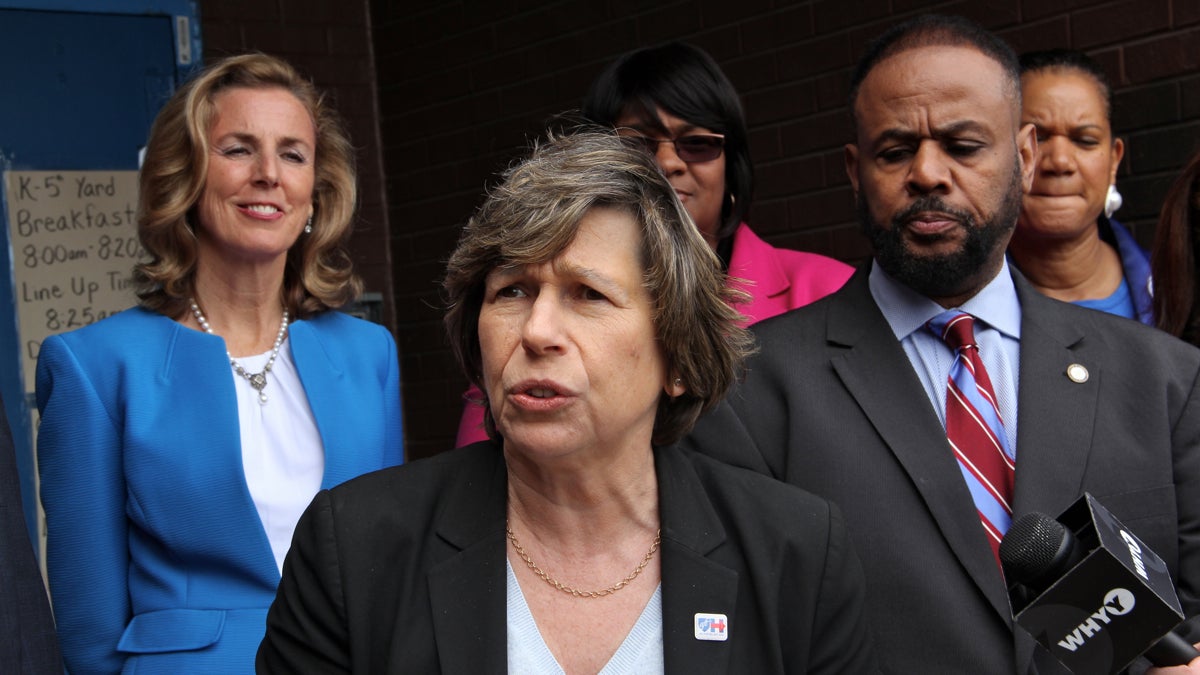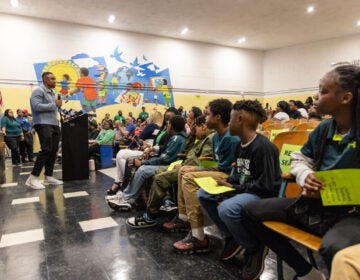Teachers’ unions sense momentum at DNC

President of the American Federation of Teachers Randi Weingarten. (NewsWorks file photo )
Teachers’ union leaders will admit it’s been a tough 16 years for them–ever since George W. Bush swept into office with an aggressive reform agenda that Barack Obama has largely carried forward.
But labor leaders have held their heads noticeably higher at this week’s Democratic National Convention thanks to recent changes in the education landscape and the party’s nomination of Hillary Clinton, who is considered a more reliable ally than Obama.
“I think what we’re seeing right now gives me hope,” said Lily Eskelsen Garcia, head of the National Education Association (NEA), at a Wednesday forum hosted by The Atlantic.
Teachers’ unions have historically been a pillar of support for Democratic politicians, both in terms of organizing and financial backing. During the Obama years, however, that patronage didn’t buy much favor. The Obama administration pushed increased teacher accountability, school turnarounds, and other education reforms that have long irked unions. That tension manifested in 2014 when the NEA called on Obama’s Secretary of Education, Arne Duncan, to resign. It was perhaps the most striking example of how far the Democratic party had drifted from union orbit.
Recent events, however, paint a far sunnier picture for the NEA and America’s second-largest teacher’s union, the American Federation of Teachers (AFT). Late last year, Congress passed a new education bill to replace No Child Left Behind, the Bush-era law that paved the way for many reform measures. In March, a Supreme Court deadlock thwarted–at least for now–a challenge to the union dues structure that could have greatly diminished union clout.
Now union leaders get to parade around Philadelphia in support of a new Democratic nominee, Hillary Clinton.
“She’ll reset education policy to focus on skills like creativity and critical thinking, not more testing,” said AFT chief Randi Weingarten in remarks on the convention floor.
The AFT endorsed Clinton over Obama in the 2008 Democratic primary, and the affection for Clinton–at least among leadership–seems to have endured. Both unions endorsed the former Secretary of State in her 2016 primary battle with Bernie Sanders.
“If you haven’t gone up and looked on her website to see what she says she would prioritize in education…we could’ve written that,” said Eskelsen Garcia at The Atlantic event.
The new Democratic Party platform, meanwhile, shows a strong preference for traditional public schools over charters, multiple-measure student evaluations over strict reliance on standardized exams, and other policy positions more closely aligned to union orthodoxy. There’s a strong sense at the DNC that teacher’s unions feel they’ve re-emerged as a powerful force within the Democratic Party.
“[Hilary Clinton’s] going to listen to a lot of people. But we’re going to be in her ear first,” Eskelsen Garcia told Education Week.
All this national momentum for teachers’ unions presents an interesting contrast to the local scene.
The Philadelphia Federation of Teachers has also enjoyed recent triumphs at the ballot box. The unions helped elect Pennsylvania Governor Tom Wolf, Philadelphia Mayor Jim Kenney, and City Councilwoman At-Large Helen Gym, all of whom have expressed varying shades of skepticism when it comes to education reform.
That said, Philly teachers have gone more than 1,000 days without a contract and roughly four years without a raise. Teacher shortages in the School District of Philadelphia caused regular disruptions last school year and long-term funding woes have forced many educators to spend out of pocket. The union’s power, meanwhile, has been undermined by a dramatic dip in membership over the last decade.
So is the cheery outlook of national union heads out of sync with local realities in cities like Philadelphia?
“Where we are is, change in the environment, but the places at most risk have not felt it in the classroom and on the ground,” said Weingarten at The Atlantic forum. “We’re getting together to now make the same fights we’ve done nationally, now make them local.”
WHYY is your source for fact-based, in-depth journalism and information. As a nonprofit organization, we rely on financial support from readers like you. Please give today.





